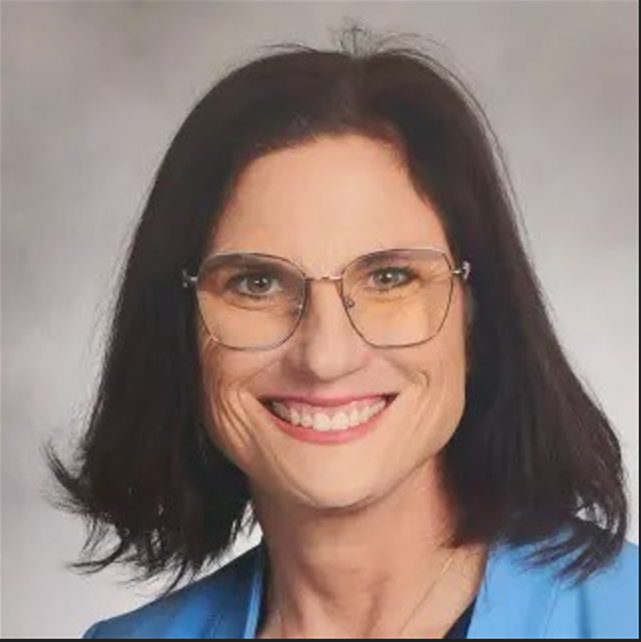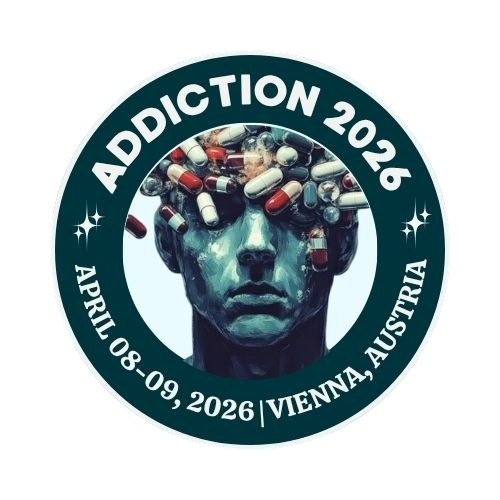Welcome Message
We are delighted to invite participants from around the world to join us for Addiction 2026, which will be held on April 08–09, 2026, in Vienna, Austria. Inspired by the theme "Neural Pathways to Recovery and Resilience – Advancing Science, Psychiatry, and Holistic Care in Addiction Treatment" this conference will bring together leading psychiatrists, neuroscientists, clinical psychologists, and researchers to explore the latest breakthroughs in addiction, neurobiology, and psychiatric care.
From the neurobiology of addiction to innovative behavioral therapies and holistic treatment approaches, the conference aims to foster collaboration, spark innovation, and address the global challenges of addiction and psychiatric disorders. Delegates will gain valuable insights from distinguished speakers, participate in workshops, and engage in discussions designed to inspire new approaches in research and clinical practice.
We warmly welcome you to share your findings, exchange ideas, and connect with fellow professionals committed to improving mental health and addiction recovery worldwide. Together, let us advance understanding, promote resilience, and transform lives.
We look forward to welcoming you to Vienna, Austria, for an inspiring and impactful gathering in April 2026.
Target Audience:
-
Psychiatrists
-
Addiction medicine specialists
-
Clinical psychologists
-
Psychotherapists and counsellors
-
Psychiatric nurses and nurse practitioners
-
Primary care physicians involved in mental health or addiction care
-
Rehabilitation center directors and treatment providers
-
Social workers (mental health and substance use)
-
Case managers and recovery coaches
-
Public health professionals
-
Researchers in addiction, neuroscience, and behavioral health
-
University faculty and graduate students (medicine, psychology, public health)
-
Policy makers in mental health and substance use
-
Government health agency representatives
-
Non-profit leaders working in addiction recovery
-
Harm-reduction specialists and community program leaders
-
Pharmaceutical industry professionals (addiction treatment focus)
-
Digital health and mental-health technology innovators
-
Mental health advocacy organizations
-
Students and trainees in mental health, nursing, and social sciences
About Conference
The 18th International Conference on Addiction & Psychiatry will be held on April 08–09, 2026, in Vienna, Austria. Inspired by the theme “Neural Pathways to Recovery and Resilience – Advancing Science, Psychiatry, and Holistic Care in Addiction Treatment”, this premier event brings together leading psychiatrists, neuroscientists, and clinical psychologists from around the world to explore the latest advancements in addiction, neurobiology, and psychiatric care.
The conference provides a platform for knowledge exchange, collaboration, and innovation, featuring keynote lectures, plenary sessions, workshops, and interactive discussions. Attendees will gain insights into topics such as behavioral therapy, pharmacotherapy, and resilience-building strategies.
Participants will have the opportunity to network with international experts, present research, and engage in discussions on emerging trends and evidence-based practices. The event emphasizes the importance of holistic approaches, trauma-informed care, and policy-driven solutions in addiction psychiatry, with particular attention to mechanisms of neuroadaptation.
Join us in Vienna to advance knowledge, foster collaboration, and contribute to global efforts in understanding and treating addiction and psychiatric disorders.
Why to Attend:
The 18th International Conference on Addiction & Psychiatry offers a distinctive platform for professionals, researchers, clinicians, policymakers, and educators dedicated to understanding, preventing, and treating addiction and mental-health disorders. This global gathering brings together leading experts and emerging voices who are committed to advancing the science and practice of addiction medicine, psychiatric care, and behavioral health.
With a focus on psychiatric pathophysiology, over two days in Vienna, participants will explore cutting-edge research, clinical innovations, and public-health strategies focused on substance-use disorders, behavioral addictions, dual diagnoses, and the evolving landscape of psychiatric treatment. Key themes include advancements in addiction neuroscience, psychopharmacology, integrated mental-health care, rehabilitation approaches, prevention frameworks, and evidence-based therapeutic interventions.
Attendees will have the opportunity to present their work, exchange knowledge, and collaborate with a diverse community dedicated to improving outcomes for individuals affected by addiction and psychiatric conditions. This conference fosters meaningful dialogue on emerging treatments, policy changes, technological innovations, and global challenges shaping the future of addiction and mental-health care, with an emphasis on advancing neurocognitive research and practice.
Whether you are a seasoned professional or an early-career researcher, this event provides an invaluable opportunity to expand your expertise, build professional networks, and contribute to the ongoing advancement of addiction science and psychiatry.
Sessions and Tracks
Addiction reshapes the brain’s reward pathways, creating compulsive behaviors that are difficult to control. Understanding the neurobiology is essential for effective interventions. Dopamine plays a pivotal role in reinforcing substance use. Genetic predisposition can influence susceptibility to addictive behaviors. Studying neuroplasticity helps clinicians develop targeted therapies. Integrating neuroscience with psychiatry offers a holistic view of addiction.
Neuroscientific Inquiry Areas:
• Reward pathway modulation
• Molecular changes in chronic use
• Neuroplastic adaptations
Individuals with addiction often experience overlapping psychiatric disorders, complicating diagnosis and treatment. Depression and anxiety are commonly observed alongside substance use. Comorbidities can intensify cravings and relapse risks. Integrated treatment models address both addiction and mental health simultaneously. Psychiatric evaluation is critical to tailor interventions effectively. Awareness of comorbid conditions enhances long-term recovery outcomes.
Clinical Co-Occurrence Themes:
• Interactions between mood and substance use
• Diagnostic complexities
• Whole-person treatment approaches
Compulsive non-substance behaviors can be as disabling as chemical addictions. Dysfunction in the prefrontal cortex disrupts decision-making and impulse control. Dysregulation in dopamine circuits reinforces repetitive behaviors. Neuroplasticity plays a role in both the development and recovery from behavioral addictions. Early detection prevents long-term neurological consequences. Cognitive-behavioral therapies help restore executive function and self-control.
Compulsive Behavior Focus Points:
• Executive-function disruptions
• Habitual reinforcement pathways
• Behavioral change strategies
Medication-assisted treatment supports recovery by reducing withdrawal symptoms and cravings. Different substances require distinct pharmacological interventions. Drugs like naltrexone, buprenorphine, and methadone modulate opioid receptors to reduce relapse risk. Pharmacotherapy is most effective when combined with behavioral therapy. Patient adherence is critical to avoid complications. Research continues to explore novel receptor-targeted therapies.
Therapeutic Medication Pathways:
• Evidence for pharmacological agents
• Patient-specific medication selection
• Novel neuro-targeted therapeutics
Cognitive-behavioral therapy helps patients identify triggers and develop coping strategies. Psychotherapy addresses maladaptive behaviors and thought patterns. Motivational interviewing enhances treatment adherence in patients. Individualized therapy focuses on the unique psychological needs of each patient. Group therapy provides social support and accountability. Integrating therapy with medical treatment improves recovery outcomes.
Therapeutic Practice Directions:
• Integrating cognitive and behavioral tools
• Enhancing motivation and readiness
• Skills-based relapse prevention
Early-life trauma significantly increases vulnerability to addictive behaviors. Dysregulation of stress hormones affects emotional control. Addiction may serve as a maladaptive coping mechanism for unresolved trauma. Trauma-informed care emphasizes safety, trust, and empowerment in therapy. Addressing trauma helps prevent relapse and psychiatric complications. Integrated treatment models improve both psychological and behavioral outcomes.
Trauma-Integrated Care Approaches:
• Stress-response alterations
• Trauma-informed intervention principles
• Healing-centered recovery models
Intense cravings are major triggers for relapse in addiction. Identifying triggers and high-risk situations is critical for prevention. Relapse prevention strategies use cognitive and behavioral tools to sustain recovery. Psychoeducation empowers patients to recognize early warning signs. Mindfulness and coping strategies reduce the impact of cravings. Long-term support is essential for maintaining abstinence.
Recovery Sustainability Elements:
• Trigger recognition systems
• Craving-management techniques
• Long-term stability supports
Genetic factors contribute to individual susceptibility to addiction. Polymorphisms in dopamine and serotonin genes influence behavior. Genetic predisposition interacts with environmental stressors to shape addiction risk. Understanding genetics aids in personalizing treatment strategies. Family history assessment helps identify high-risk individuals. Integrating genetics with behavioral therapy enhances recovery outcomes.
Genomic Influence Dimensions:
• Heritable risk markers
• Gene–environment interplay
• Precision-guided treatment concepts
Socioeconomic status and peer networks impact addiction vulnerability. Social stressors influence mental health and substance use patterns. Family and community support can mitigate risk. Awareness of social determinants allows for targeted interventions. Marginalized populations often face barriers to treatment access. Public health strategies addressing these determinants improve recovery outcomes.
Socio-Contextual Impact Areas:
• Environmental risk landscapes
• Community-level influences
• Strategies for reducing disparities
Dual diagnosis involves co-occurring psychiatric disorders and substance use. Integrated care improves outcomes by treating both conditions simultaneously. Coordination of psychiatric treatment and addiction therapy is essential. Personalized interventions address complex clinical presentations. Monitoring reduces relapse and complication risks. Evidence supports integrated programs over fragmented treatment approaches.
Integrated Care Components:
• Joint management of psychiatric and substance conditions
• Collaborative clinical pathways
• Evidence-based combined interventions
Neuroimaging reveals structural and functional brain changes associated with addiction. Techniques like fMRI and PET scans track neural activity patterns. Imaging studies identify abnormalities in dopaminergic circuits that drive addictive behaviors. These insights inform targeted therapies and treatment monitoring. Neuroimaging also helps identify high-risk individuals. Combining imaging with clinical assessments enhances precision care.
Imaging-Based Exploration Themes:
• Mapping addiction-related circuits
• Functional and structural changes
• Imaging for therapeutic guidance
Chronic stress alters brain circuits, increasing susceptibility to addiction. Dysregulation of cortisol affects self-regulation and reward sensitivity. Stress interacts with dopamine pathways to reinforce substance use. Mindfulness and coping strategies mitigate stress impact. Recognizing stressors is key in relapse prevention. Addressing stress enhances mental health and long-term recovery.
Stress–Response Research Axes:
• Hormonal and neural stress pathways
• Behavioral sensitivity under stress
• Mitigation and resilience-building methods
Adolescents are highly vulnerable due to ongoing brain development. Early exposure affects the prefrontal cortex and impulse control. Psychiatric comorbidities like ADHD increase addiction risk. Prevention programs and early interventions improve outcomes. Family involvement enhances adherence to therapy. Targeted interventions during adolescence can prevent chronic addiction.
Youth Vulnerability Domains:
• Adolescent neurodevelopment
• Early behavioral indicators
• Family-centered prevention strategies
Certain personality traits predispose individuals to addiction. Traits like impulsivity and sensation-seeking are particularly relevant. Co-occurring personality disorders complicate treatment and recovery. Tailored interventions address both behavioral patterns and underlying pathology. Psychoeducation improves insight and compliance. Long-term therapy supports sustained behavior change.
Personality–Behavior Interaction Points:
• Trait-driven vulnerability patterns
• Emotional dysregulation mechanisms
• Management of chronic behavioral profiles
Cultural norms shape attitudes toward substance use and treatment seeking. Stigma and traditional beliefs influence help-seeking behavior. Multicultural approaches enhance patient engagement and compliance. Awareness of cultural context improves treatment outcomes. Community education shifts harmful perceptions. Psychiatrists must integrate cultural sensitivity in therapy.
Cultural Health Contexts:
• Variations in perception and stigma
• Influence of cultural norms
• Culturally adaptable treatment models
Substance use disrupts sleep architecture, exacerbating psychiatric symptoms. Insomnia and hypersomnia are common in addiction. Sleep disturbances alter neurotransmitter regulation, impacting recovery. Addressing sleep improves mood and reduces relapse risk. Behavioral and pharmacological interventions enhance sleep quality. Integrating sleep management into treatment improves overall outcomes.
Sleep–Wellness Intersections:
• Sleep-cycle irregularities
• Neurochemical links to sleep disruption
• Restorative sleep interventions
Digital interventions support addiction recovery and psychiatric care. Telepsychiatry improves access for remote or underserved populations. AI-based tools and mobile apps monitor treatment adherence. Technology complements traditional therapy to enhance engagement. Data-driven approaches personalize interventions. Emerging tools include virtual reality therapies and cognitive training programs.
Digital Care Domains:
• Remote therapeutic access
• Tech-enabled patient monitoring
• Innovation in digital recovery tools
Mindfulness-based practices improve self-awareness and emotional regulation. Meditation and breathing exercises reduce stress response. Mindfulness enhances prefrontal cortex functioning, supporting impulse control. Regular practice helps patients detach from automatic substance-seeking behaviors. Integrating mindfulness with therapy promotes holistic recovery. Sustained practice lowers relapse rates and improves mental health.
Mind–Body Integration Lines:
• Techniques for emotional grounding
• Cognitive clarity practice
• Mindfulness-supported recovery pathways
Government policies influence prevention, treatment access, and harm reduction. Harm reduction strategies like supervised consumption reduce morbidity. Integration of addiction services in public health systems improves outcomes. Policy evaluation ensures resources target high-need populations. Evidence-based advocacy supports systemic improvements. Societal engagement reduces stigma and promotes recovery.
Public Health Governance Areas:
• Prevention and harm-reduction models
• Policy implementation analysis
• System-level transformation strategies
Recovery is strengthened by social support networks. Family involvement improves adherence and emotional stability. Peer support and community programs provide structure and accountability. Community resources enhance reintegration and vocational opportunities. Strengthening social bonds reduces isolation and relapse risk. Holistic recovery addresses the individual within their social environment.
Support System Pillars:
• Family strengthening approaches
• Community recovery engagement
• Reintegration and resilience frameworks Market Trends & Analysis
Market analysis
The global Addiction Treatment and Psychiatry market has been experiencing significant growth, driven by the increasing prevalence of substance-use disorders and rising awareness of mental health challenges worldwide. Recent analyses indicate that the market value is expected to rise from around USD 9.9 billion in 2025 to over USD 16 billion by 2034, registering a compound annual growth rate (CAGR) between 5.5% and 6.5%. This steady expansion reflects a global shift toward recognizing addiction and psychiatric disorders as public health priorities requiring integrated, multidisciplinary care.
North America continues to lead the market due to advanced treatment infrastructure, widespread acceptance of therapy, and government-backed rehabilitation initiatives. However, the Asia–Pacific region is rapidly emerging as the fastest-growing market, driven by improved accessibility to mental health services, technological adoption in digital therapy, and expanding community-based rehabilitation programs. Europe also shows steady growth, supported by strong policy frameworks and research collaboration in mental health and addiction care.
Key trends shaping the market include the growing use of medication-assisted treatment (MAT), the rise of telepsychiatry and digital health platforms, and the increasing adoption of personalized and holistic treatment models that address both addiction and co-occurring psychiatric conditions. Despite this progress, challenges such as treatment gaps in low-resource settings, workforce shortages, and persistent social stigma remain barriers to care. Nevertheless, the global addiction and psychiatry field continues to evolve rapidly, presenting new opportunities for research, innovation, and evidence-based clinical practice.
Global Addiction & Psychiatry Market Growth Forecast (2025–2034):
This graph illustrates the projected rise in the global addiction treatment and psychiatry market, growing from approximately USD 9.9 billion in 2025 to over USD 16 billion by 2034. The consistent upward trend reflects increasing global awareness, advancements in psychiatric care, and the growing adoption of evidence-based treatment models for addiction recovery.

Regional Market Share and Growth Outlook:
North America currently dominates the global market, driven by robust healthcare infrastructure and strong policy support. The Asia–Pacific region is projected to show the fastest growth over the coming decade, supported by expanding access to care, digital therapy adoption, and mental health awareness initiatives. Europe remains a stable and mature market, contributing significantly to global research and innovation in addiction psychiatry.

Abstract Submission and Registration
Researchers, clinicians, academicians, industry experts, and practitioners working in addiction science, psychiatry, behavioral health, neuroscience, rehabilitation, and public health are invited to submit original contributions. Submissions may include research abstracts, full papers, case studies, clinical reports, poster presentations, or e-posters, based on themes listed in the “Call for Abstracts” or relevant areas of professional interest.
Abstract Guidelines
-
All abstracts must be submitted in English.
-
Abstracts should not exceed 500 words.
-
Use sentence case for the title and ensure it reflects the focus of the work.
-
Provide the full name of the presenting author and all co-authors, along with their institutional affiliations.
-
Include a brief biography of the presenting author (maximum 150 words) and a recent professional photograph.
-
Submissions may cover addiction medicine, substance-use disorders, behavioral addictions, psychiatric treatment models, therapeutic innovations, epidemiology, dual diagnosis, public-health strategies, and related fields.
Review Process
All submitted abstracts will be reviewed by the Scientific Committee. Authors will receive notifications of acceptance or requests for revision via email, typically within 24–48 hours of submission.
Publication
Accepted abstracts will be included in the official conference proceedings and may be published in a partner journal or symposium series in the field of addiction research and psychiatric sciences.
Abstract Submission Link: https://addiction.psychiatryconferences.com/abstract-submission.php
Registration
After abstract acceptance, participants must register through the conference registration portal. Early registration is encouraged to secure participation in this international event dedicated to advancing research and clinical practice in addiction and psychiatry.
Registration link: https://addiction.psychiatryconferences.com/registration.php
Visa Guidelines
The organizing committee of the 18th International Conference on Addiction and Psychiatry 2026 is not directly involved in visa processing; however, we provide essential documents to support participants applying for a Schengen Visa to Austria.
The following documents can be issued upon request:
-
Letter of Invitation
-
Letter of Abstract Acceptance
-
Registration Payment Receipt
These supporting documents may help with your visa application, though additional requirements may apply depending on the embassy or consulate.
Letter of Invitation
The Letter of Invitation serves as confirmation that your abstract submission and/or registration has been approved by the conference committee. It is issued in English and can be used as supporting documentation for your visa application. Please note that issuance of the letter does not guarantee visa approval, as final decisions are made by the embassy or consulate.
Participation & Presentation Opportunities
Oral Presentations
We welcome researchers, clinicians, policy-makers, and individuals with lived experience to submit oral presentations on topics advancing addiction and psychiatry research or clinical practice. Presentations may cover areas such as substance use disorders, psychiatric comorbidities, prevention, treatment innovations, mental health policy, or novel therapeutic interventions.
-
Duration: 30 minutes total – 20–25 minutes for the presentation, followed by a 5–10 minute Q&A moderated by the session chair.
-
Format: Slide-based presentation (PowerPoint or equivalent) with interactive discussion.
-
Who can present: Individuals, clinicians, academics, and collaborative research teams.
Keynote Sessions
Keynote speakers will deliver high-impact presentations lasting 40–45 minutes, followed by an interactive discussion period. Keynotes highlight major trends, breakthroughs, or thought leadership in psychiatry and addiction research and practice.
Workshops
Workshops provide an interactive platform for skills-building, advanced methods, and practical demonstrations relevant to addiction and psychiatric care.
-
Duration: Approximately 45–50 minutes.
-
Format: Facilitated discussion, group exercises, case studies, or hands-on demonstrations.
-
Team presentations: Collaborative presentations from research or clinical teams are encouraged.
Poster Presentations
The Poster Competition offers an opportunity for early-career researchers, graduate students, and trainees to display original work and gain feedback from experts.
-
Duration: 5–7 minutes for the presentation, including Q&A.
-
Poster size: Hard copy – 1?m × 1?m.
-
Focus areas: Original research, pilot studies, case reports, clinical interventions, or innovative programs.
Webinar / Virtual Presentations
For participants unable to attend in person, the conference provides a virtual presentation option:
-
Submit a pre-recorded video presentation for inclusion in the official webinar sessions.
-
Presenters may respond to live or asynchronous audience questions during the session.
E-Poster Presentations
Remote participants may submit E-Posters to be displayed on the conference website.
-
Accepted abstracts will appear in the conference proceedings and digital gallery, with DOI indexing.
Exhibition & Industry Engagement
The conference features an Exhibition Pavilion for organisations to present products, services, and innovations in addiction treatment, mental health technologies, and psychiatric care.
-
Exhibitors may include: pharmaceutical companies, clinical trial organizations, treatment centres, healthcare consultants, research institutions, mental health startups, and technology developers.
-
The exhibition provides a platform to network, showcase innovations, and foster collaborations.
Advertising & Sponsorship
-
Advertising in the conference program reaches attendees throughout the event and provides long-term visibility.
-
Sponsorship packages are available for organisations seeking high-impact branding opportunities and engagement with participants.
Communication Guidelines
-
Add the official conference email (meevents@memeetings.com) to your safe sender list.
-
If you do not receive a confirmation within 48 hours of registration or inquiry, contact the conference team.
-
Check your spam/junk folder before reaching out.
Group Registration & Important Notes
-
Discounted group registration rates are available. Contact the registration team for eligibility and rates.
-
Include your mobile phone number during registration and abstract submission to enable timely communication regarding updates or urgent notices.
By following these guidelines, participants will have a seamless and engaging experience at the 18th International Conference on Addiction & Psychiatry, advancing both professional knowledge and collaborative connections.
Past Conference
The 17th International Conference on Addiction & Psychiatry, held on April 24–25, 2025 in Vienna, Austria, concluded with exceptional success, bringing together a diverse community of mental health professionals, addiction specialists, psychiatrists, researchers, therapists, and policy experts from across the globe. The conference served as a vital platform for advancing knowledge, sharing breakthrough research, and discussing innovative strategies to address the complex challenges associated with addiction and psychiatric disorders.
The event saw strong global participation and featured:
-
150+ international delegates from over 25 countries
-
30+ keynote and plenary presentations from leading experts
-
Multiple scientific sessions focused on addiction treatment, substance use disorders, behavioral addictions, dual diagnosis, psychiatric interventions, and mental health policy
-
Workshops and interactive panel discussions addressing emerging therapies, community mental health approaches, digital interventions, rehabilitation models, and prevention strategies
-
Poster presentations showcasing new and evolving research in addiction and psychiatry
Participants highly appreciated the conference for its scientific depth, interactive format, and collaborative atmosphere. The event fostered meaningful dialogue among mental health professionals and created new opportunities for international collaboration, research partnerships, and innovation in the fields of addiction medicine and psychiatry.
The conference's success reaffirmed its importance as a premier global platform dedicated to reducing the burden of addiction, advancing mental health understanding, and improving treatment outcomes globally.
As we look ahead, we invite you to join us for the 18th International Conference on Addiction & Psychiatry, taking place on April 08–09, 2026 in Vienna, Austria, aimed at further advancing innovation, interdisciplinary learning, and evidence-based practices in the field.










